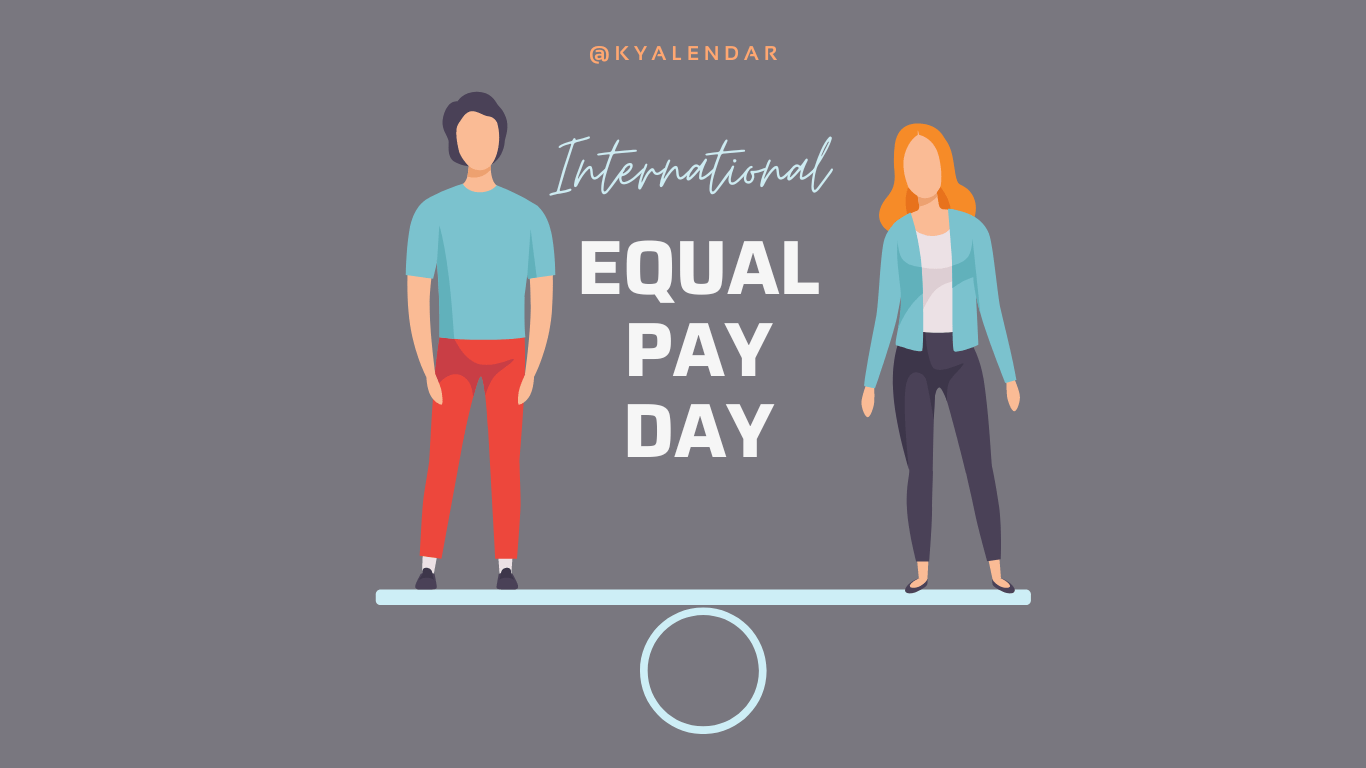
- This event has passed.
International Equal Pay Day
September 18

International Equal Pay Day, observed annually on 18th September, is a significant day dedicated to highlighting the persistent issue of wage disparity between men and women. Despite decades of progress in gender equality, the gender pay gap remains a stark reality in many parts of the world. This day serves as a global reminder that equal work should be rewarded with equal pay, regardless of gender.
The Origins of International Equal Pay Day
International Equal Pay Day was established by the United Nations to bring global attention to the ongoing struggle for gender pay equality. It reflects the broader commitment of the international community to eliminate gender-based discrimination in the workplace. The day is part of a wider effort to achieve gender equality, as outlined in the United Nations’ Sustainable Development Goals, particularly Goal 5, which focuses on achieving gender equality and empowering all women and girls.
Understanding the Gender Pay Gap
The gender pay gap refers to the difference in average earnings between men and women. This disparity is often expressed as a percentage of male earnings. For instance, if women earn 80% of what men earn, there is a 20% gender pay gap. The causes of the gender pay gap are complex and multifaceted, including factors such as:
- Occupational Segregation: Women and men often work in different industries and occupations, with female-dominated sectors typically offering lower wages than male-dominated ones.
- Unpaid Care Work: Women are more likely to take on unpaid care responsibilities, such as child-rearing and eldercare, which can limit their participation in the labour market and impact their earning potential.
- Discrimination: Despite legal frameworks against gender discrimination, implicit biases and stereotypes can influence hiring, promotion, and pay decisions, disadvantaging women in the workplace.
- Part-Time Work: Women are more likely than men to work part-time, often due to caregiving responsibilities. Part-time jobs generally offer lower hourly wages and fewer benefits.
- Lack of Negotiation: Studies have shown that women are less likely to negotiate their salaries compared to men, which can contribute to the pay gap.
The Impact of Wage Inequality
The gender pay gap is not just a matter of fairness; it has far-reaching consequences for individuals, families, and society as a whole. Wage inequality contributes to:
- Economic Disadvantage: Women who earn less than their male counterparts are more likely to experience poverty, particularly in their later years. This economic disadvantage can affect their ability to afford housing, healthcare, and education for their children.
- Reduced Economic Growth: Gender pay gaps can hinder economic growth by underutilising the talents and skills of half the population. Equal pay can contribute to a more dynamic and prosperous economy.
- Social Inequality: Wage disparity reinforces broader gender inequalities in society, perpetuating cycles of disadvantage and limiting opportunities for women to achieve financial independence and security.
- Lower Pensions: As women typically earn less and are more likely to take career breaks, they are often left with lower pensions, leading to a higher risk of poverty in old age.
The Importance of International Equal Pay Day
International Equal Pay Day plays a crucial role in raising awareness about the gender pay gap and advocating for change. It encourages governments, employers, and individuals to take concrete steps towards achieving wage equality. Key objectives of the day include:
- Raising Awareness: The day aims to inform the public about the persistence of the gender pay gap and the importance of closing it. By increasing awareness, it encourages dialogue and action on the issue.
- Advocating for Policy Change: International Equal Pay Day calls on governments to implement and enforce policies that promote equal pay for equal work. This includes measures such as pay transparency, stronger anti-discrimination laws, and support for working parents.
- Encouraging Employers to Take Action: Employers are urged to examine their pay practices, address any disparities, and create a workplace culture that values and rewards all employees equally.
- Empowering Women: The day seeks to empower women to advocate for themselves in the workplace, whether through salary negotiation, seeking promotions, or challenging discriminatory practices.
Steps Towards Achieving Equal Pay
Achieving equal pay for equal work requires concerted efforts from all sectors of society. Some key strategies include:
- Pay Transparency: Encouraging or mandating pay transparency can help expose wage gaps and hold employers accountable. When salaries are transparent, it becomes easier to identify and address disparities.
- Legislation and Enforcement: Strong legal frameworks are essential to protect workers from discrimination and ensure that equal pay laws are effectively enforced. Governments must also provide resources for enforcement and support workers who seek redress.
- Workplace Policies: Employers can implement policies that promote gender equality, such as flexible working arrangements, parental leave, and initiatives to support women’s career advancement.
- Education and Training: Providing education and training opportunities for women can help them enter higher-paying fields and negotiate better salaries. Encouraging women to pursue careers in traditionally male-dominated industries can also help close the gap.
- Cultural Change: Addressing the gender pay gap requires a shift in societal attitudes towards gender roles and work. Challenging stereotypes and promoting gender equality in all aspects of life can contribute to a more equitable workforce.
Conclusion
International Equal Pay Day is a powerful reminder that the fight for gender equality is far from over. While progress has been made, significant challenges remain in closing the gender pay gap. This day calls on all of us—governments, employers, and individuals—to commit to achieving wage equality. By working together, we can create a world where everyone, regardless of gender, is paid fairly for their work.